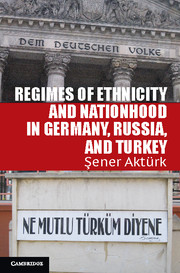Book contents
- Frontmatter
- Contents
- List of Tables, Figures, Graphs, and Maps
- List of Abbreviations
- Acknowledgments
- Part I Theoretical Framework and Empirical Overview
- Part II Germany
- 2 The Challenges to the Monoethnic Regime in Germany, 1955–1982
- 3 The Construction of an Assimilationist Discourse and Political Hegemony
- Part III Turkey
- Part IV Soviet Union and The Russian Federation
- Part V Conclusion
- Bibliography
- Index
- References
3 - The Construction of an Assimilationist Discourse and Political Hegemony
Transition from a Monoethnic to an Antiethnic Regime in Germany, 1982–2000
Published online by Cambridge University Press: 18 December 2014
- Frontmatter
- Contents
- List of Tables, Figures, Graphs, and Maps
- List of Abbreviations
- Acknowledgments
- Part I Theoretical Framework and Empirical Overview
- Part II Germany
- 2 The Challenges to the Monoethnic Regime in Germany, 1955–1982
- 3 The Construction of an Assimilationist Discourse and Political Hegemony
- Part III Turkey
- Part IV Soviet Union and The Russian Federation
- Part V Conclusion
- Bibliography
- Index
- References
Summary
Here one encounters an actual piece of South Africa in the social and political order of the Federal Republic.
Joschka Fischer, 1984The best form of integration is assimilation.
Otto Schily, 2002Monoethnic Regime Entrenched: Conservative-Liberal Coalition, 1982–1998
The ascent to power of the Christian Democratic Union/Christian Social Union-Free Democratic Party (CDU/CSU-FDP) coalition government of Helmut Kohl spelled the end of any illusions about a progressive reform of the citizenship law or naturalization procedures (Table 15). Upon assuming the chancellor position, Kohl announced that cutting the number of “foreigners” by half would be one of the three major goals of his administration. Along with unemployment, the “problem of foreigners” was declared as the most important domestic political issue. Here one observes again the crucial role that words play in reinforcing ethnicity regimes, which has other examples in the case of Germany, the Soviet Union, Russian Federation, and Turkey. By using the word foreigner (Ausländer), as was customary in German politics in referring to that segment of the resident population without German citizenship, Kohl could propose a policy that would otherwise send shockwaves across Europe and the Atlantic if he had used the words ethnic minorities or even simply minorities. “Cutting down the population of ethnic minorities by half” is not a government program that any major political party in Germany, except for marginal extreme right-wing parties, could easily endorse.
- Type
- Chapter
- Information
- Publisher: Cambridge University PressPrint publication year: 2012

